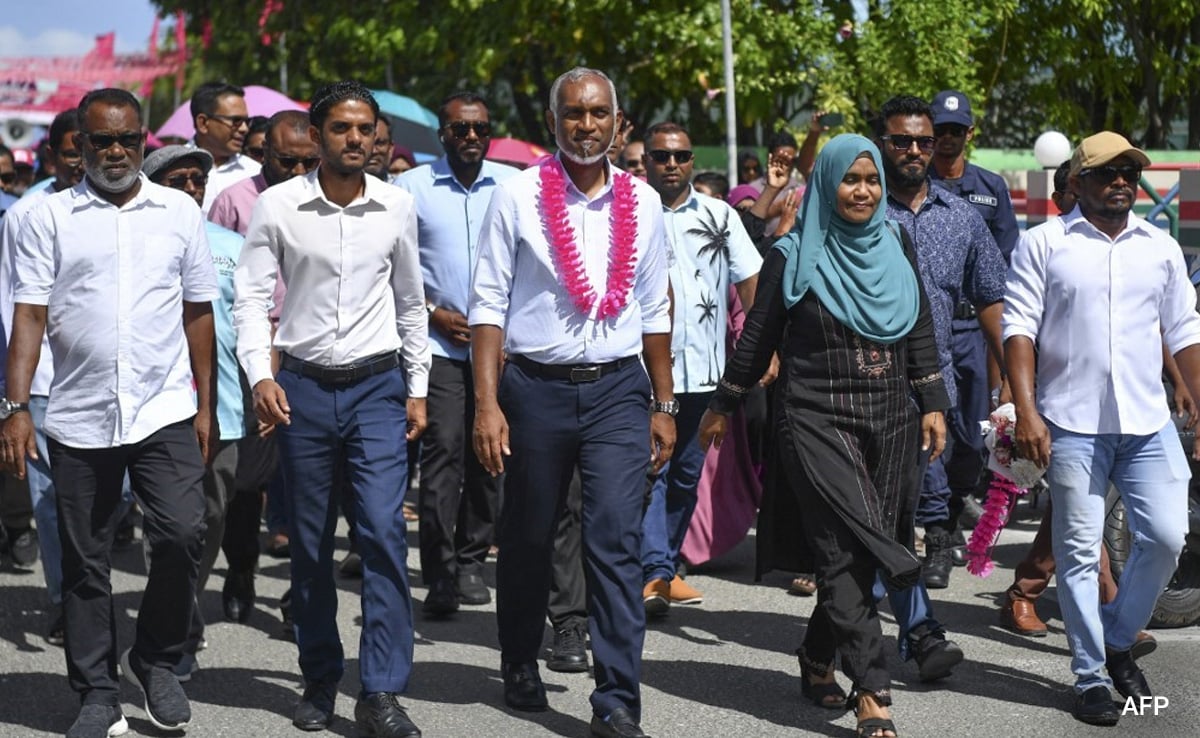
Muizzu’s allies say his election would help rid the country of foreign interference altogether.
Colombo:
The Maldives votes in a presidential runoff on Saturday that could drastically rebalance its relations with India and China, two regional giants competing for influence in the geopolitical hotspot.
The atoll nation of nearly 1,200 coral islets is a prestige tourism hotspot and favourite beach holiday destination for the world’s rich and famous.
It also sits in a strategically vital position in the middle of the Indian Ocean, astride one of the world’s busiest east-west shipping lanes.
Frontrunner Mohamed Muizzu’s party moved into Beijing’s orbit while last in office and was an eager recipient of financial largesse from China’s Belt and Road infrastructure programme.
Muizzu, the 45-year-old mayor of Male, spearheaded the $200 million China-backed bridge linking the capital to the country’s main airport while in the last government.
He won just over 46 percent of the first round earlier this month while incumbent Ibrahim Mohamed Solih, who presided over the restoration of ties with traditional benefactor India, trailed at 39 percent.
But with only 283,000 eligible voters, and barely 15,000 votes between the pair, former foreign minister Ahmed Shaheed told AFP the contest was on a knife’s edge.
“The mood in the Maldives suggests that the two candidates are narrowing their gap,” Shaheed said.
“This is going to be a very, very close race.”
Solih won office in 2018 on the back of discontent with his autocratic predecessor Abdullah Yameen, an ally of Muizzu’s who is now serving an 11-year prison sentence for corruption.
He had accused Yameen of pushing the country into a Chinese debt trap by borrowing heavily for infrastructure.
Yameen’s turn towards Beijing had alarmed New Delhi, which shares Western concern at China’s growing assertiveness in the Indian Ocean and is a member of the strategic Quad alliance alongside the United States, Australia and Japan.
Solih, 61, moved swiftly to repair the relationship with India, inviting Prime Minister Narendra Modi to attend his inauguration and allowing a boost to its small military presence.
‘Independence and sovereignty’
Since losing the first round on September 9, Solih has sought to rally support by campaigning on local issues such as housing.
Muizzu’s Progressive Party of Maldives (PPM) has kept the debate focused on diplomacy by hammering Solih’s stance towards India, a country with outsized political and economic clout in the nation that has long been a source of disaffection.
The PPM and activist groups have regularly staged street protests demanding a reduction of Indian influence in the Muslim nation.
Public anger against India was partly a reflection of people’s frustration with the perceived or real corruption of the Solih administration, Shaheed said.
He added that the stability of the next government would depend on charting a course that avoided antagonising either of the archipelago’s powerful suitors.
“The next president will have to balance the interests of both India and China,” Shaheed told AFP. “You can’t spurn India and survive.”
Muizzu’s allies say his election would help rid the country of foreign interference altogether.
Dunya Maumoon, a former cabinet minister who served alongside Muizzu, told AFP this week she supported his efforts to help “rescue the country’s independence and sovereignty”.
But Muizzu has been open about his plans to pursue the pro-Beijing tilt of his mentor Yameen.
He told an online meeting with Chinese Communist Party representatives last year that if the PPM returned to power it would “script a further chapter of strong ties between our two countries”.
(Except for the headline, this story has not been edited by NDTV staff and is published from a syndicated feed.)




